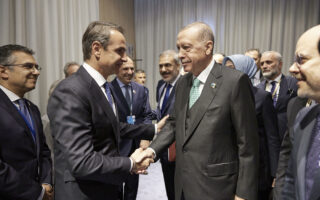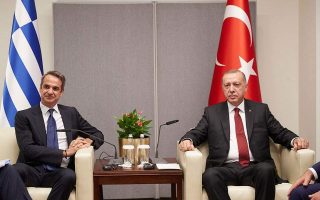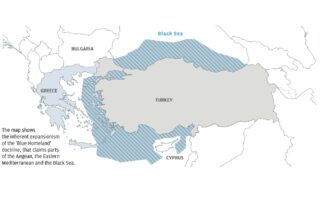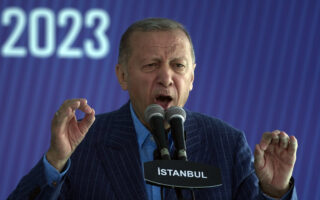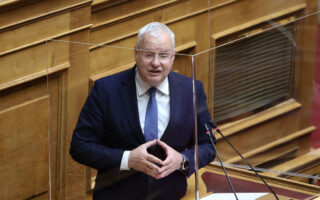Survival and ambivalence: The story of Lausanne
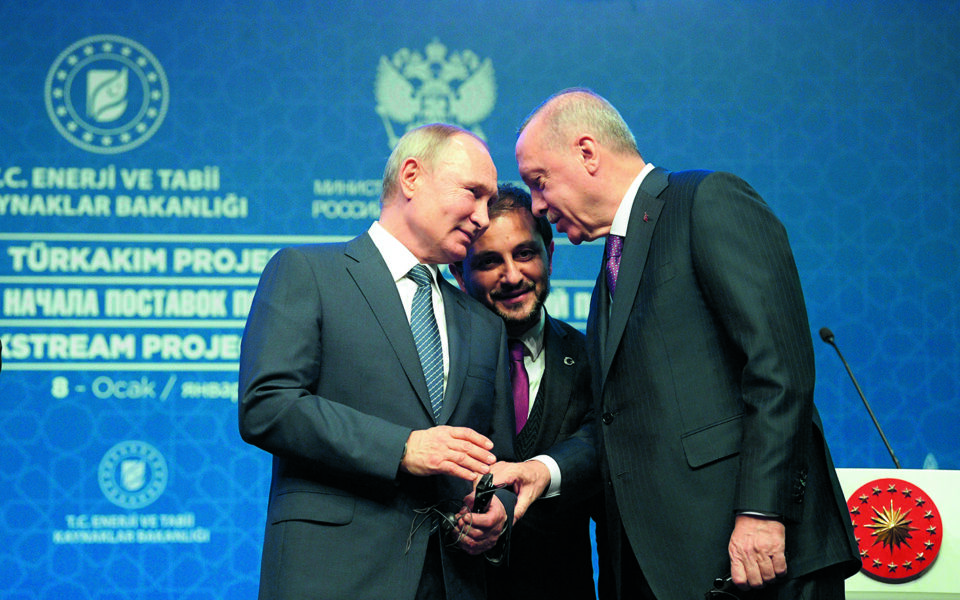
The year of Our Lord 2023 has been a roller-coaster for Orthodox Christians in Turkey. On August 15, it seems, Ecumenical Patriarch Vartholomaios will celebrate an emotionally resonant liturgy at the Monastery of Panagia Soumela; permission was granted on July 24 after a report four days earlier that it had been refused.
This year’s paschal celebrations, on the patriarch’s home island of Imbros, also brought surprises. At the last minute Greek Foreign Minister Nikos Dendias was allowed to join His All Holiness for an Epitaphios procession in the steep, rainy streets of a mountain village.
The reopening of the island’s defunct airport for the minister’s aircraft was an unexpected concession after a period of boiling tension in bilateral relations.
And every such gesture, small and large, is being studied closely because of this year’s centenary of the Lausanne Treaty.
Among Greeks, the treaty is associated above all with the population exchange which confirmed the expulsion from Turkey of at least 1.3 million people and theoretically guaranteed the rights of those who remained.
The treaty also establishment a territorial settlement which, although painful, was seen in Athens as a basis for peace.
In the collective memory of Turkey’s political class, the associations of the word “Lausanne” are different. The spirit of Lausanne is summed up in a single word – sovereignty.
Lord Curzon, the British foreign secretary who chaired the Lausanne conference, told Turkey’s representative Ismet Pasha: “You play the same tune day after day until we are sick of it – sovereignty, sovereignty, sovereignty…”
Curzon was right. Ismet made concessions in other areas (for example, over Iraqi Mosul) as long as he could minimize the right of outsiders to influence Turkey’s internal affairs. Among the biggest gains of Lausanne, from the Turkish viewpoint, was the abolition of the capitulations under which Westerners enjoyed exemptions from Ottoman law. Thanks to the treaty, a weak empire – perpetually bullied by stronger ones – was changed into a sharply defined nation-state, whose masters would have a free hand to engage in a tough program of nation-building.
From this perspective, Ismet did not entirely succeed in his stated aims.
Articles 38 to 44 of the Lausanne Treaty oblige Turkey to respect the religious, cultural and educational rights of non-Muslims.
But these obligations – very spasmodically observed – probably seemed like a minor concession when compared with the deep involvement of foreign powers in the affairs of the Ottoman Christians in the 19th and early 20th century. And the population exchange ensured that non-Muslim minorities would be a tiny portion of the population. With respect to Muslim citizens of Turkey, Lausanne gave the republic’s masters an absolutely free hand to impose cultural uniformity.
In a sense, Lausanne epitomized the idea of the well-defined, homogenized nation-state which many countries in Eastern and Southeastern Europe, including Greece, were aiming to create after the First World War. To that extent the Turkish memory of Lausanne has some basis in historical fact.
The remarkable thing about the treaty is that it has survived so many twists and turns in world history.
Lausanne’s overwhelming emphasis on sovereignty at almost any cost, combined with agreed borders and relative freedom in domestic affairs, has been succeeded by many different fashions in diplomacy.
The founding texts of the United Nations affirmed the principles of self-defense, territorial integrity and non-aggression.
At the same time, however hypocritically, the signatories of the UN Charter on Human Rights accepted an obligation to respect their own citizens – and abstain from expelling them. Although there have been many more mass expulsions in practice, the idea of an officially mandated population exchange became impossible with the adoption of the charter. But in the Aegean, the exchange was an accomplished fact.
Through institutions like the Council of Europe, groups of countries then accepted a more formal right to assess one another’s human rights performance. This led to awkward moments for the Lausanne-based Turkish Republic, including rebukes from the European Court of Human Rights, but the spirit and letter of the Lausanne Treaty broadly survived.
The wheel turned yet again after the Cold War, with the emergence of assertive liberal internationalism: a belief that liberal democracy and rule of law could be spread almost everywhere thanks to a mixture of incentives and threats. This led to a period of optimism that Turkey would gain accession to the European Union, and settle all differences with Greece, by making the internal reforms demanded by Brussels.
Accepting the EU’s demands would have meant surrendering the “sovereignty” which was demanded by Ismet – but it seemed for a while that modern Turkey was willing to make that sacrifice. Today, a century after Lausanne, the phase of liberal self-confidence seems well and truly over. The rising tendency in global affairs is a reaction against American-led liberal internationalism, a trend which has led to some odd coalitions – linking Russia, China, the Islamic countries and parts of the Global South.
Turkey’s response has been profoundly ambivalent.
The cordial relationship between Recep Tayyip Erdogan and Vladimir Putin, amid much anti-liberal rhetoric, is one reflection of the new Zeitgeist. It faintly reflects the Soviet-Turkish understanding which underpinned Ismet’s confidence in Lausanne.
But Turkey has not left NATO, or the Council of Europe. It has carved out a pivotal role in diplomacy over Ukraine and gained a space for maneuver which no other NATO member enjoys. Yet none of these developments amounts (as yet) to a renunciation of Lausanne, whose main principles – in the Turkish memory – are territorial self-restraint in return for freedom of action at home.
Return, for a moment, to the Patriarchate. For Greeks, decent treatment of that institution is simply a minimal fulfillment of Turkey’s Lausanne-based obligations to respect minorities. For Turkish officialdom, erratic treatment of the patriarch underlines the opposite point: that decisions about the activities of religious institutions inside Turkey are to be made by Turkey alone.
Perhaps one secret of the treaty’s survival is the fact that its spirit has been interpreted so differently on each side of the Aegean. That difference is dangerous, but a world without Lausanne would be much more dangerous.
Bruce Clark is international security editor at The Economist and the author of “Twice A Stranger: How Mass Expulsion Forged Modern Greece and Turkey{IDIOT}.
